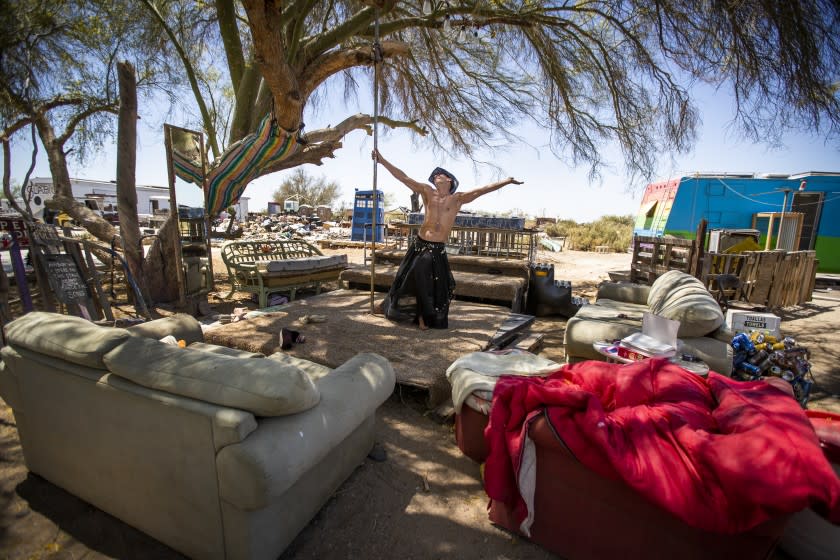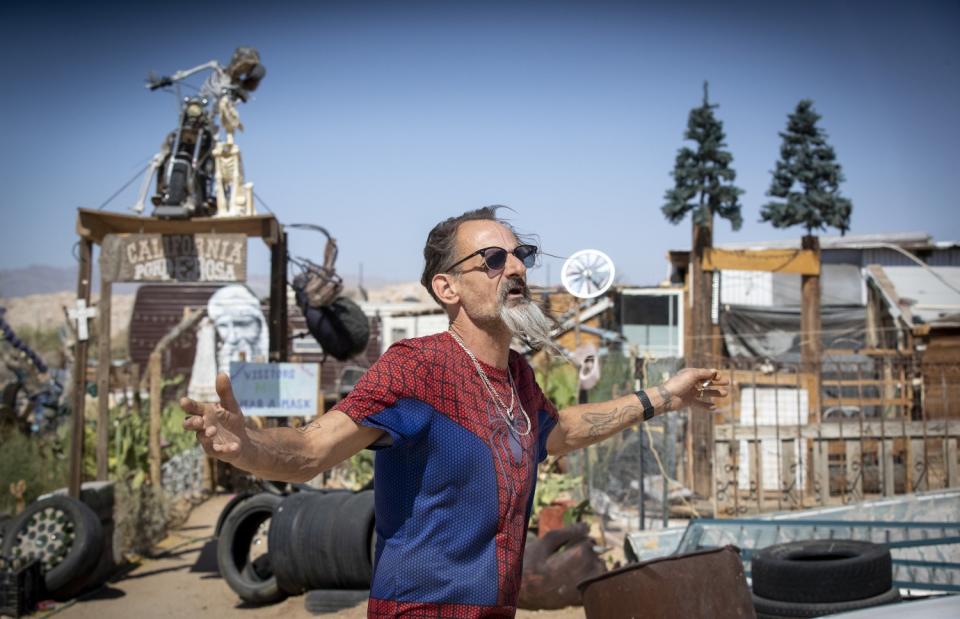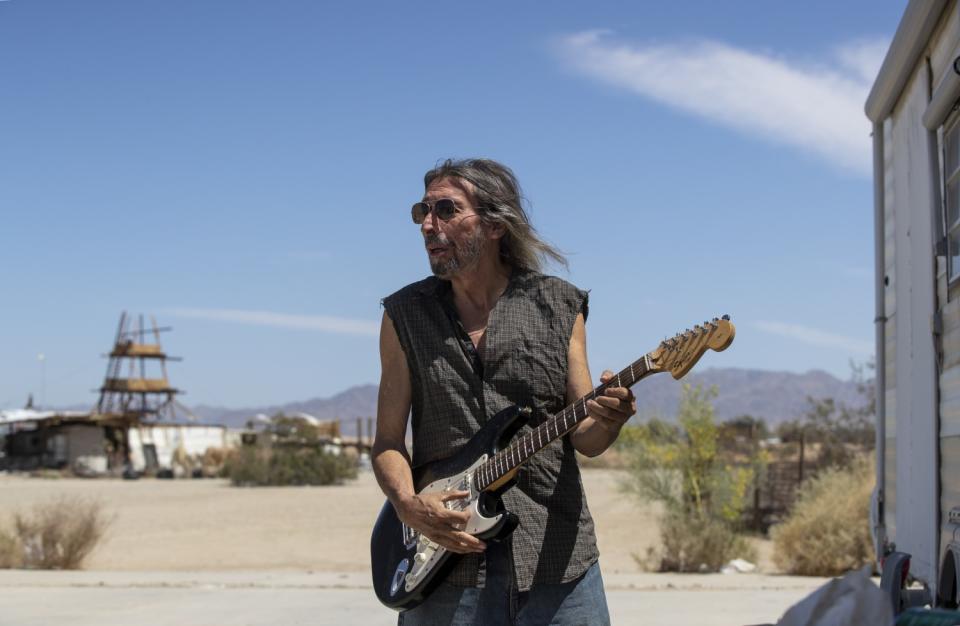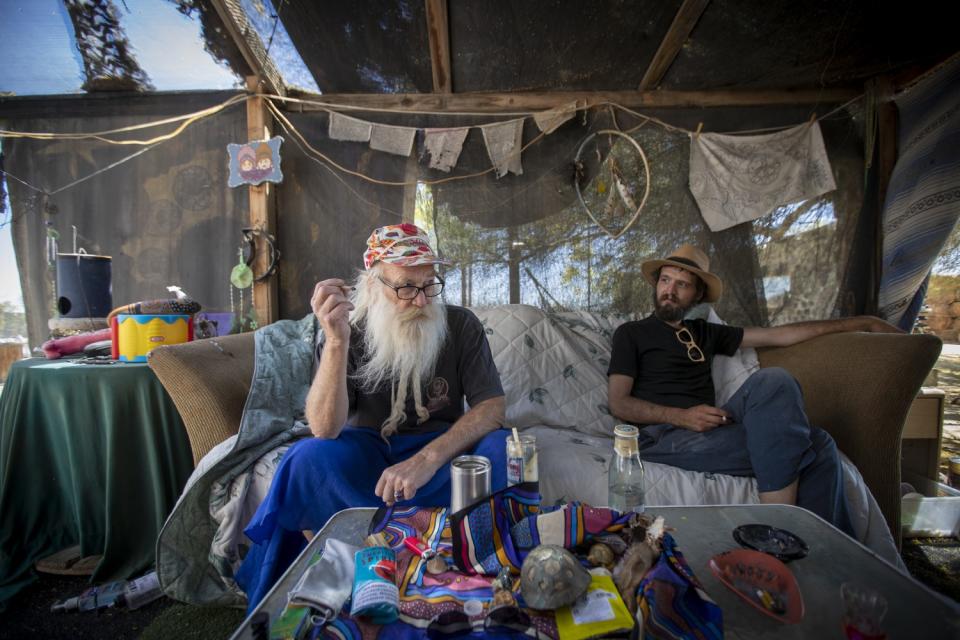Slab City offered quirky isolation, but there's no escaping a pandemic

The dusty compound is cluttered with rusted school buses and wooden shacks. Cacti stud the grounds and Christmas lights drape dried tree stumps. When the wind blows over the nearby Salton Sea, wind chimes serenade as Slab City slumbers.
This Shangri-La of desert weirdness has for years drawn tourists from around the world. Some would stay in one of the dilapidated RV's rented out by Rodney "Spyder" Wild. It cost only $30, and guests got breakfast and running water.
But even the "last free place in America," as locals call it, didn't stand a chance against COVID-19.
"The people that come visit me — Iceland, Russia, Japan — stopped coming," said Wild, 55, the owner of the RV compound that he rents out on Airbnb. "The pandemic hurt people all over the world."

Slab City has always appealed to the hardiest of wanderers. Retirees and snowbirds have migrated to this public land in Imperial County for decades in search of a rent-free and funky lifestyle.
They drove in with their RVs or built makeshift homes on the dirt or concrete slabs, the remains of a defunct World War II military training camp. Fueled in popularity by Hollywood and social media for its unconventional way of life, it grew into a booming community of creative types, oddballs and squatters.
But the pandemic has all but severed Slab City's already tenuous link to the outside world.
In 2020, foreign tourists from Europe and Canada were shut out of entering the United States. Musicians and artists stayed away when the Range, the community's popular outdoor music venue, shut down. Hostel and Airbnb owners saw their revenue slashed. And daily gathering activities for residents were canceled out of fear of spreading the coronavirus.

It’s unclear whether there has been a confirmed coronavirus case in Slab City.
As of Sunday, the Imperial County coronavirus tracker listed 107 cases and three deaths within the 92257 ZIP Code, which includes Niland, portions of Bombay Beach and Slab City. Those who live in “the slabs” say there were a few cases in the area but can't pinpoint a name or say exactly what happened.
With the pandemic now receding, Slab City still may not benefit.
Though hangouts such as the Range and Wild's California Ponderosa RV compound are planning to reopen, many people are preparing to leave before temperatures reach 100. Only a few yearlong residents bear the brunt of the scorching heat.
Wild, who sports a "true slabber" tattoo on his biceps, is struggling to bounce back from nearly a year of canceled reservations. So far, he's had one guest, a friend from the East Coast, book a stay. He doesn't expect many others to come through as summer sets in. His Airbnb may be the only one with a sign demanding that masks be worn.

That's because Slab City has more than its share of people who think this patch of scrubland is impervious to disease.
“We don’t wear masks. We share the same marijuana pipe. We don’t wash the shot glasses at the local bar,” said Peter Passalacqua, 51, as he jumped onto his stripper pole and twirled on his elevated dance floor. After a mini-performance, bedecked in a glimmering gold-fringed skirt, he sat on his mattress with his dog, Puppito, and declared the pandemic a hoax.
In his open studio, he encourages guests to remove their masks and swig $1 shots at the nearby bar, Redrum Room.
“They’re just jonesing for something to do, man,” he said. If they give off the right vibe and bring steak dinners as gifts, Passalacqua said, he lets them spend the night at his camp free of charge.

Despite the celebratory defiance of pandemic safety protocols from some Slab City residents, plenty have been vaccinated.
The majority of the older residents in Slab City drove into the tiny town of Niland or across state lines to Yuma, Ariz., for the vaccine, said Bill Ammon, owner of the Range and a longtime resident who goes by "Builder Bill." He said he isn't sure about the younger crowd — the "dreadlock children" — who started showing up in droves after the 2007 movie "Into the Wild" depicted the slabs as an "idyllic picture of a hippie haven."
"I think we're protected by the fact that we're living outdoors," he said. "And if you notice, there's a natural spacing between residences, so you don't have that density factor that makes the disease spread. Plus, we're kind of isolated from the population of the rest of the world."
In Slab City, anyone can find his or her niche. Those at Pirate Camp party and drink rum. Long-term residents and retirees camp out at the Poverty Flats. Bookworms can read from the hundreds of donated books at the Lizard Tree Library on the outskirts of the slabs.
The first thing tourists see is Salvation Mountain, a giant, candy-colored structure made from adobe and straw, topped by a cross, with "God is love" painted on its facade.
Tony "Kaboom," 33, who declined to give his last name, and Sophie Narigon, 30, found their fellow travelers at Pirate Camp. The couple left their Midwest homes with their dog, Wayne, and zigzagged throughout states before landing at the slabs in February. They were welcomed into the camp after a few drinks with a self-described pirate.
The thought of getting the coronavirus in their rickety shack wasn't a concern. They showed no interest in getting vaccinated. They did, however, worry about Wayne getting canine parvovirus, a highly contagious disease that is often fatal if left untreated. With many dogs roaming the slabs, they isolated in a desolate area until Wayne got his shots.
"The second day we got here we thought, 'We're not leaving.' There's freedom of self-expression," Kaboom said, "and no homeless people."

While chatting, Narigon served cheeseburger macaroni for lunch and Kaboom spray-painted a piece of metal. Ska music blasted from a tiny radio propped atop a teetering shelf.
It was much quieter at Bob Johnson's hostel. The shoeless businessman with pink toenails relaxed on a couch, smoking a cigarette. None of his campers or hammocks were booked.
He said he lost about $1,200 within the first two months of the pandemic. It wiped out his clientele, and he was lonely, desperate to meet someone.
He reluctantly took in Matt Crowe, 31, four months ago. The former restaurant manager grew jaded about his life in Florida and sought a very early retirement. He learned about the slabs online and bought a one-way ticket to California. He booked a two-week stay at the hostel and never left.
Crowe already considers himself a full-fledged Slabber. But Johnson, noting the tranquility of pandemic life, disagrees. Crowe hadn't seen a glimpse of the real Slab City yet, Johnson said.

Meanwhile, Ammon, owner of the Range, is eager to reopen. He will make signs requiring masks and social distancing and needs to double-check that the venue's stage lights still work.
The musicians who have graced his stage come from all over, but it's more about community than musicianship, he said. "Some of them are really terrible."
This story originally appeared in Los Angeles Times.

